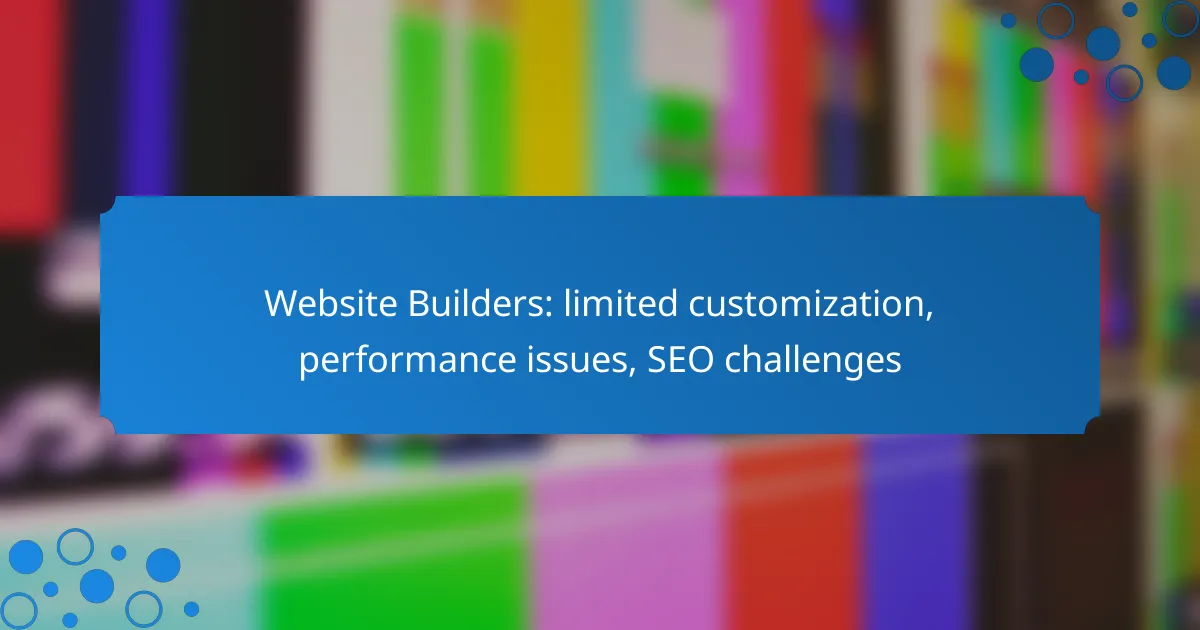Website builders offer a convenient way to create online presence, but they often come with limitations in customization, performance, and SEO. While platforms like Wix, Squarespace, and WordPress provide user-friendly interfaces, they may restrict design flexibility and optimization options. Additionally, common SEO challenges such as slow loading times and limited access to essential features can hinder a site’s visibility and overall effectiveness.
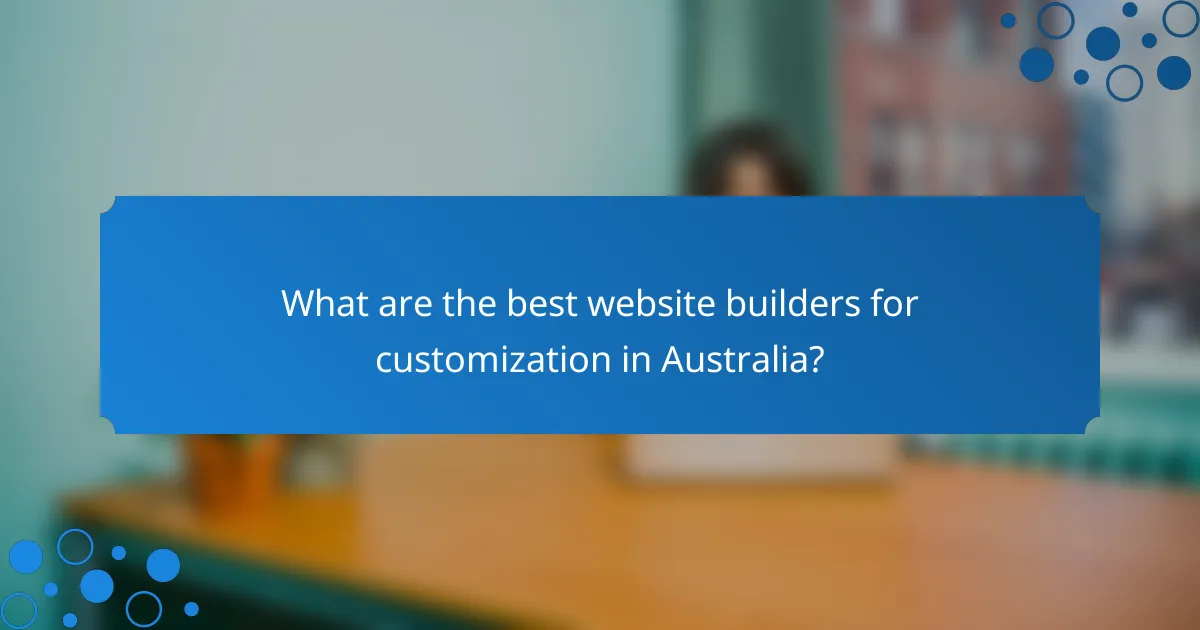
What are the best website builders for customization in Australia?
The best website builders for customization in Australia include Wix, Squarespace, and WordPress. Each platform offers unique features that cater to different design needs and levels of flexibility.
Wix for flexible design options
Wix is known for its drag-and-drop interface, allowing users to create highly customized websites without needing coding skills. It offers a vast library of templates and design elements that can be easily adjusted to fit specific branding needs.
One key consideration with Wix is its flexibility; users can move elements freely on the page. However, this can lead to performance issues if not managed properly, so it’s important to optimize images and avoid excessive animations.
Squarespace for aesthetic control
Squarespace excels in providing visually stunning templates that are ideal for creatives and businesses focused on aesthetics. The platform allows for customization of layouts, colors, and fonts, ensuring a polished look that aligns with brand identity.
While Squarespace offers great design control, it may have limitations in functionality compared to other builders. Users should carefully evaluate whether the available features meet their specific needs, especially for e-commerce or complex integrations.
WordPress for extensive plugin support
WordPress is a powerful platform that offers extensive customization through thousands of plugins and themes. Users can enhance their sites with various functionalities, from SEO tools to e-commerce solutions, making it highly adaptable.
However, the learning curve can be steeper than with other builders. It’s essential to choose reliable plugins to avoid performance issues and ensure security. Regular updates and maintenance are also necessary to keep the site running smoothly.
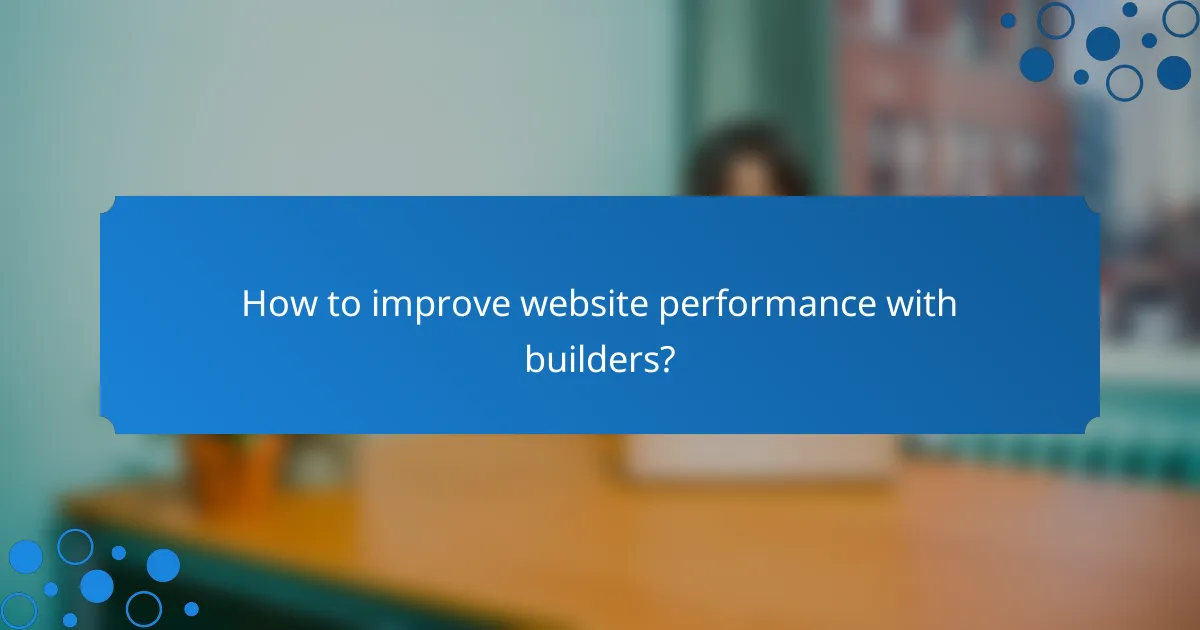
How to improve website performance with builders?
Improving website performance with builders involves optimizing various aspects of your site to enhance speed and user experience. Key strategies include using optimized templates, leveraging CDN services, and minimizing image sizes.
Using optimized templates
Optimized templates are pre-designed layouts that are streamlined for speed and efficiency. When selecting a template, look for those that are lightweight and coded with best practices in mind, as this can significantly reduce loading times.
Consider templates that are specifically designed for performance, often labeled as “fast” or “lightweight.” These templates typically avoid excessive scripts and heavy graphics, making them ideal for builders.
Leveraging CDN services
Content Delivery Networks (CDNs) distribute your website’s content across multiple servers worldwide, reducing latency and improving load times for users regardless of their location. Implementing a CDN can lead to faster access to your site, especially for visitors far from your main server.
Choose a reputable CDN service that integrates well with your website builder. Many popular builders offer easy integration options with CDNs, allowing you to enhance performance without complex setups.
Minimizing image sizes
Large images can significantly slow down your website, so minimizing their sizes is crucial for performance. Use image formats like JPEG or WebP, which provide good quality at smaller file sizes, and consider compressing images before uploading them.
Tools like TinyPNG or ImageOptim can help reduce image sizes without sacrificing quality. Aim for images that are optimized for web use, ideally under 100 KB each, to ensure quick loading times across your site.
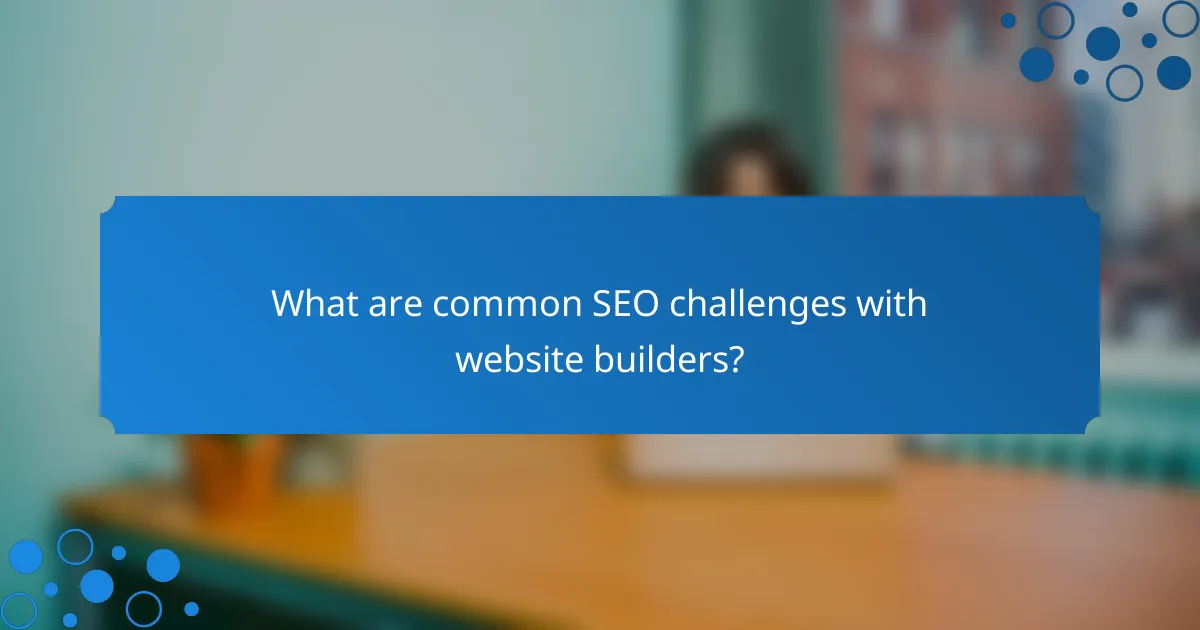
What are common SEO challenges with website builders?
Website builders often present several SEO challenges that can hinder a site’s visibility and performance. Key issues include limited access to essential SEO features, difficulties in implementing structured data, and slow loading times that negatively impact search rankings.
Limited access to meta tags
Many website builders restrict user access to crucial meta tags, such as title and description tags. This limitation can prevent site owners from optimizing their pages effectively, leading to less relevant search results and lower click-through rates.
To mitigate this issue, choose a website builder that allows customization of meta tags. Look for options that provide clear interfaces for editing these tags, ensuring they align with your content and target keywords.
Difficulty in implementing structured data
Structured data helps search engines understand the content of your site better, but many website builders make it challenging to implement. Without structured data, your site may miss out on rich snippets, which can enhance visibility in search results.
To address this, consider using a website builder that supports schema markup or offers plugins for easy integration. Familiarize yourself with common structured data formats, such as JSON-LD, to improve your site’s chances of appearing in enhanced search results.
Slow loading times affecting rankings
Website builders can lead to slow loading times due to heavy templates and unoptimized code, which can negatively affect your SEO rankings. Search engines prioritize fast-loading sites, and delays can lead to higher bounce rates.
To improve loading times, select a website builder that emphasizes performance and allows for optimization. Regularly test your site’s speed using tools like Google PageSpeed Insights and make necessary adjustments, such as compressing images or minimizing scripts.
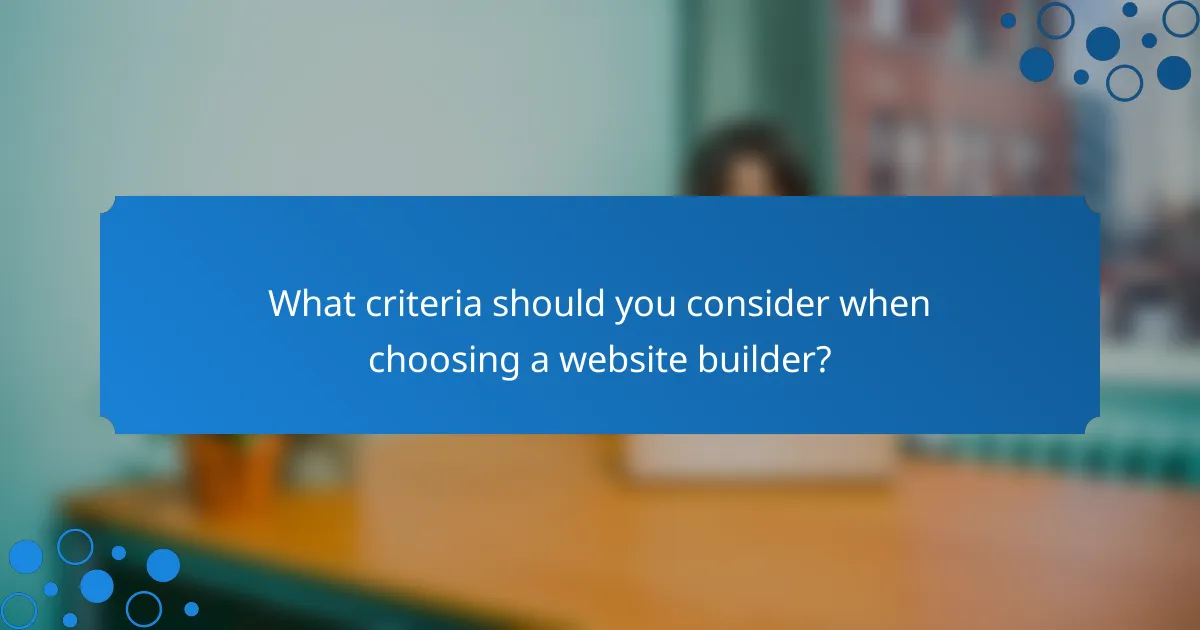
What criteria should you consider when choosing a website builder?
When selecting a website builder, focus on customization capabilities, performance metrics, and SEO features. These criteria will significantly impact your site’s functionality, speed, and visibility in search engines.
Customization capabilities
Customization capabilities refer to how much you can modify the design and functionality of your website. Some builders offer extensive templates and drag-and-drop features, while others may limit your options to predefined layouts.
Consider whether you need advanced features like custom CSS or JavaScript integration. If your business requires a unique look or specific functionalities, choose a builder that allows for greater flexibility in design and coding.
Performance metrics
Performance metrics include loading speed, uptime, and responsiveness. A website that loads quickly—ideally in under three seconds—provides a better user experience and can improve search engine rankings.
Check the hosting infrastructure of the website builder. Some platforms may experience slower speeds during peak traffic times, which can affect your site’s performance. Look for builders that offer reliable uptime guarantees, typically above 99.9%.
SEO features
SEO features are essential for improving your website’s visibility on search engines. Look for builders that provide built-in SEO tools, such as customizable meta tags, alt text for images, and clean URL structures.
Additionally, consider whether the builder supports mobile optimization and fast loading times, both of which are crucial for SEO. Some platforms may offer integrated analytics to help you track your site’s performance and make necessary adjustments.
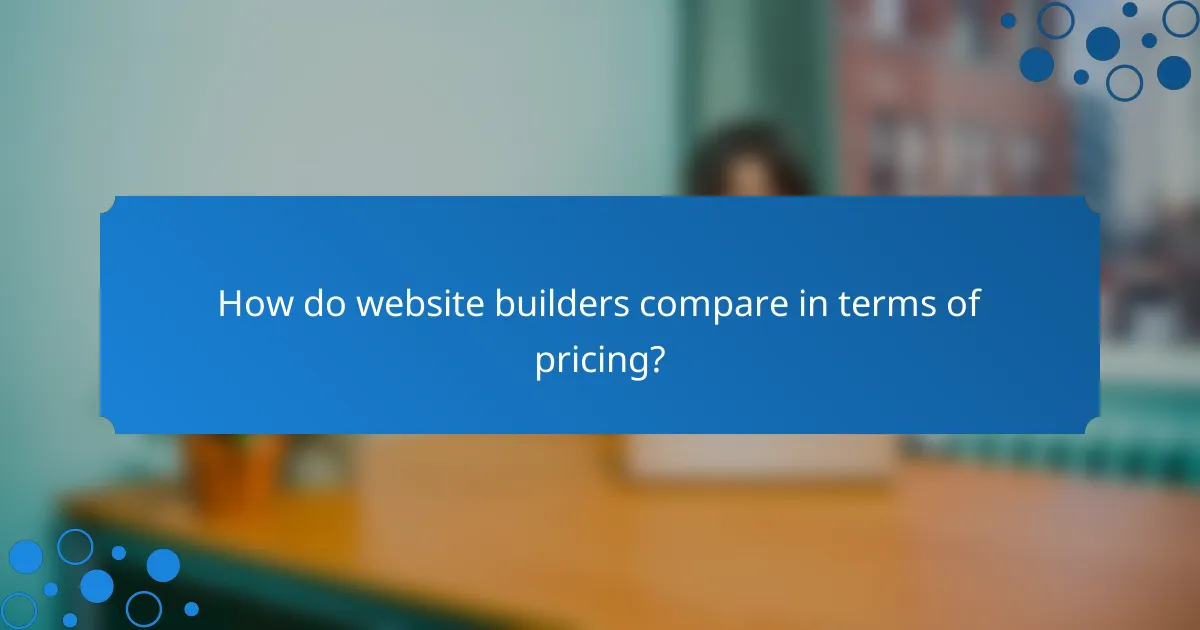
How do website builders compare in terms of pricing?
Website builders vary significantly in pricing, often offering tiered plans that cater to different needs and budgets. Understanding these pricing structures helps users select a platform that aligns with their financial and functional requirements.
Wix pricing tiers
Wix offers several pricing tiers, typically ranging from basic plans to more advanced options. The basic plan usually starts at around $14 per month, providing essential features, while higher tiers can go up to $39 per month, including advanced functionalities like e-commerce capabilities and increased storage.
When choosing a Wix plan, consider the specific features you need, such as custom domain names and ad removal. Users should also be aware of the annual billing discounts that can lower overall costs.
Squarespace subscription plans
Squarespace has four main subscription plans, with prices starting at approximately $16 per month for personal use and reaching up to $54 per month for advanced e-commerce features. Each plan includes various tools for design, marketing, and analytics.
It’s important to evaluate what each plan offers in terms of storage, bandwidth, and transaction fees. Squarespace often provides a free trial, allowing users to test features before committing to a subscription.
WordPress hosting costs
WordPress hosting costs can vary widely based on the hosting provider and the level of service. Basic shared hosting plans can start as low as $3 to $10 per month, while managed WordPress hosting can range from $20 to $100 or more per month, depending on the features and support included.
When selecting a hosting plan, consider factors like website traffic, performance needs, and whether you require additional services like backups and security. Many providers offer introductory rates, so it’s wise to review renewal prices before making a decision.
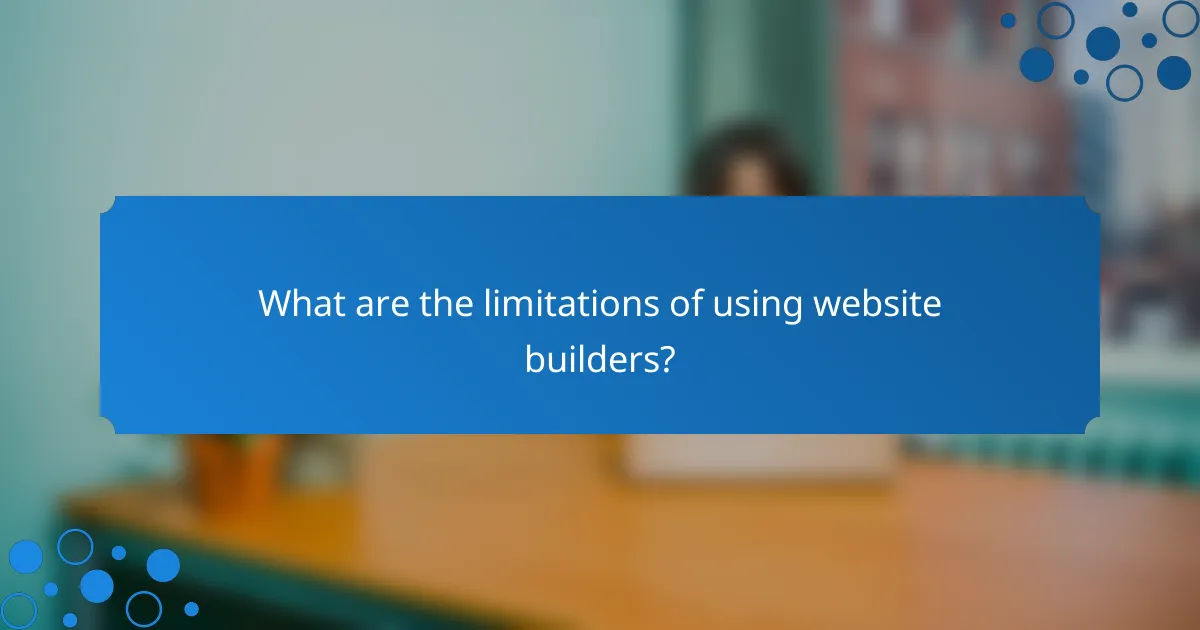
What are the limitations of using website builders?
Website builders often come with significant limitations that can affect design, performance, and search engine optimization (SEO). Users may find restricted customization options, slower loading times, and challenges in optimizing their sites for search engines.
Restricted design flexibility
Website builders typically offer a range of templates and themes, but these can limit your design flexibility. Users may struggle to implement unique branding elements or specific layouts, as customization options are often confined to predefined settings.
For instance, while you can change colors and fonts, altering the structure of a page or adding custom features may not be possible without advanced coding skills. This can hinder businesses looking to create a distinctive online presence.
To maximize design flexibility, consider using a builder that allows for some level of code editing or integration with third-party tools. Always review the customization capabilities before committing to a platform.
Performance issues
Performance can be a significant drawback of website builders, as they often rely on shared hosting environments. This can lead to slower loading times, particularly during peak traffic periods, which may negatively impact user experience and SEO rankings.
Many website builders do not optimize images and scripts automatically, which can further degrade performance. Users should be aware that a slow site can lead to higher bounce rates, as visitors may leave before the page fully loads.
To mitigate performance issues, choose a builder known for speed optimization features, and regularly test your site’s loading times using tools like Google PageSpeed Insights. Consider compressing images and minimizing the use of heavy scripts.
SEO challenges
SEO challenges are common with website builders, as they may not provide the necessary tools for effective optimization. Users might find it difficult to customize meta tags, alt text, and URL structures, which are crucial for search engine visibility.
Some platforms may also generate non-SEO-friendly URLs or limit the ability to implement essential SEO practices, such as schema markup. This can hinder a site’s ability to rank well on search engines like Google.
To improve SEO on a website builder, look for platforms that offer built-in SEO tools or plugins. Regularly update content and ensure that your site is mobile-friendly, as these factors significantly influence search rankings.
